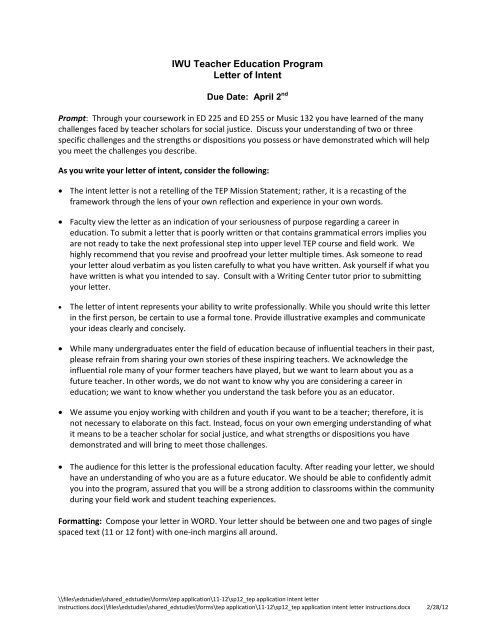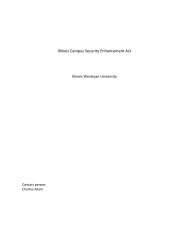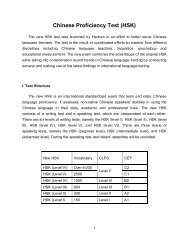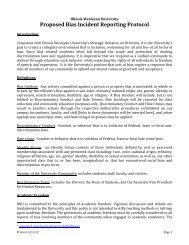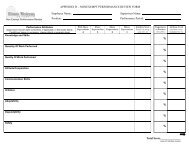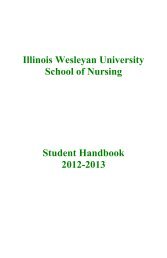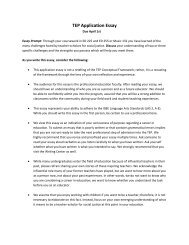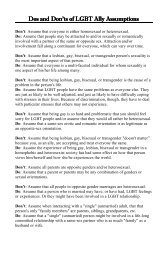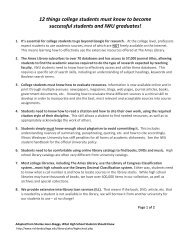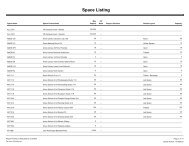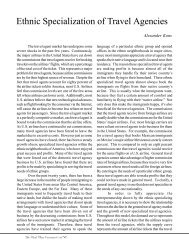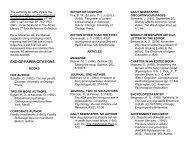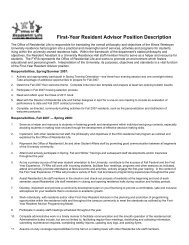TEP Letter of Intent Instructions
TEP Letter of Intent Instructions
TEP Letter of Intent Instructions
You also want an ePaper? Increase the reach of your titles
YUMPU automatically turns print PDFs into web optimized ePapers that Google loves.
IWU Teacher Education Program<br />
<strong>Letter</strong> <strong>of</strong> <strong>Intent</strong><br />
Due Date: April 2 nd<br />
Prompt: Through your coursework in ED 225 and ED 255 or Music 132 you have learned <strong>of</strong> the many<br />
challenges faced by teacher scholars for social justice. Discuss your understanding <strong>of</strong> two or three<br />
specific challenges and the strengths or dispositions you possess or have demonstrated which will help<br />
you meet the challenges you describe.<br />
As you write your letter <strong>of</strong> intent, consider the following:<br />
• The intent letter is not a retelling <strong>of</strong> the <strong>TEP</strong> Mission Statement; rather, it is a recasting <strong>of</strong> the<br />
framework through the lens <strong>of</strong> your own reflection and experience in your own words.<br />
• Faculty view the letter as an indication <strong>of</strong> your seriousness <strong>of</strong> purpose regarding a career in<br />
education. To submit a letter that is poorly written or that contains grammatical errors implies you<br />
are not ready to take the next pr<strong>of</strong>essional step into upper level <strong>TEP</strong> course and field work. We<br />
highly recommend that you revise and pro<strong>of</strong>read your letter multiple times. Ask someone to read<br />
your letter aloud verbatim as you listen carefully to what you have written. Ask yourself if what you<br />
have written is what you intended to say. Consult with a Writing Center tutor prior to submitting<br />
your letter.<br />
• The letter <strong>of</strong> intent represents your ability to write pr<strong>of</strong>essionally. While you should write this letter<br />
in the first person, be certain to use a formal tone. Provide illustrative examples and communicate<br />
your ideas clearly and concisely.<br />
• While many undergraduates enter the field <strong>of</strong> education because <strong>of</strong> influential teachers in their past,<br />
please refrain from sharing your own stories <strong>of</strong> these inspiring teachers. We acknowledge the<br />
influential role many <strong>of</strong> your former teachers have played, but we want to learn about you as a<br />
future teacher. In other words, we do not want to know why you are considering a career in<br />
education; we want to know whether you understand the task before you as an educator.<br />
• We assume you enjoy working with children and youth if you want to be a teacher; therefore, it is<br />
not necessary to elaborate on this fact. Instead, focus on your own emerging understanding <strong>of</strong> what<br />
it means to be a teacher scholar for social justice, and what strengths or dispositions you have<br />
demonstrated and will bring to meet those challenges.<br />
• The audience for this letter is the pr<strong>of</strong>essional education faculty. After reading your letter, we should<br />
have an understanding <strong>of</strong> who you are as a future educator. We should be able to confidently admit<br />
you into the program, assured that you will be a strong addition to classrooms within the community<br />
during your field work and student teaching experiences.<br />
Formatting: Compose your letter in WORD. Your letter should be between one and two pages <strong>of</strong> single<br />
spaced text (11 or 12 font) with one‐inch margins all around.<br />
\\files\edstudies\shared_edstudies\forms\tep application\11-12\sp12_tep application intent letter<br />
instructions.docx\\files\edstudies\shared_edstudies\forms\tep application\11-12\sp12_tep application intent letter instructions.docx 2/28/12
Assessment<br />
• Your letter <strong>of</strong> intent will be blind reviewed by the pr<strong>of</strong>essional education faculty and will be<br />
evaluated according to the criteria outlined in the assessment rubric. In the case <strong>of</strong> an<br />
unsatisfactory evaluation, you will have only one opportunity to rewrite the letter.<br />
• The letter is just one measure <strong>of</strong> your eligibility for acceptance into the Teacher Education Program.<br />
Candidates must meet all other entrance requirements explicated in the Teacher Education<br />
Handbook.<br />
Faculty will use the assessment rubric below to evaluate your letter. Carefully study the criteria prior<br />
to submitting your letter.<br />
Content<br />
Quality<br />
<strong>of</strong><br />
Writing<br />
Length<br />
and<br />
Format<br />
IWU Teacher Education Program<br />
<strong>Letter</strong> <strong>of</strong> <strong>Intent</strong> Rubric<br />
Pass with Honors Pass Rewrite *<br />
<strong>Letter</strong> is thorough and thoughtful<br />
and reveals a sophisticated and<br />
accurate understanding <strong>of</strong> significant<br />
challenges faced by teacher scholars<br />
for social justice, drawing on course<br />
content from Ed 225 and 255, or<br />
Music 132.<br />
<strong>Letter</strong> is a particularly thoughtful<br />
reflection on individual and<br />
pr<strong>of</strong>essional strengths in response to<br />
the challenges <strong>of</strong> teaching for social<br />
justice. Furthermore, illustrative<br />
examples from course and field work<br />
explicitly reflect the dispositions<br />
described in the <strong>TEP</strong> Mission.<br />
Writing quality strikes a pr<strong>of</strong>essional<br />
tone, and is sophisticated, artful, and<br />
enlightening. The letter is organized<br />
and flows well; ideas are<br />
communicated clearly and concisely.<br />
There are no errors in composition,<br />
syntax, spelling, or semantics.<br />
<strong>Letter</strong> is thorough and thoughtful<br />
and reveals a developing and<br />
accurate understanding <strong>of</strong> two or<br />
three significant challenges faced<br />
by teacher scholars for social<br />
justice, drawing on course<br />
content from Ed 225 and 255, or<br />
Music 132.<br />
<strong>Letter</strong> provides specific examples<br />
from course and field work <strong>of</strong><br />
individual and pr<strong>of</strong>essional<br />
strengths in response to the<br />
challenges <strong>of</strong> teaching for social<br />
justice.<br />
<strong>Letter</strong> is written in a pr<strong>of</strong>essional<br />
tone. <strong>Letter</strong> is interesting,<br />
organized, and flows well.<br />
Writing quality is acceptable for<br />
candidates ready to embark on<br />
the next level <strong>of</strong> pr<strong>of</strong>essional<br />
education. <strong>Letter</strong> contains few to<br />
no errors in composition, syntax,<br />
spelling, or semantics.<br />
<strong>Letter</strong> adheres to the required length, 11 or 12 font, one-inch margins,<br />
and single-spacing requirements.<br />
Comments:<br />
* Any one item highlighted in the rewrite column requires a rewrite.<br />
<strong>Letter</strong> does not address the prompt<br />
or indicates superficial<br />
understandings <strong>of</strong> the challenges<br />
faced by teacher scholars for social<br />
justice. Author fails to reference<br />
learning from course or field work.<br />
<strong>Letter</strong> simply repeats phrases from<br />
the Program Mission Statement<br />
without clarifying their meaning.<br />
<strong>Letter</strong> fails to draw from course or<br />
field work. Weak or insufficient<br />
examples <strong>of</strong> individual and<br />
pr<strong>of</strong>essional strengths in response to<br />
the challenges <strong>of</strong> teaching for social<br />
justice.<br />
Writing quality is below what is<br />
acceptable, indicating candidate is<br />
not ready to move to the next level<br />
<strong>of</strong> pr<strong>of</strong>essional education.<br />
Composition errors are either<br />
frequent or grievous. (Candidate is<br />
expected to have a better command<br />
<strong>of</strong> composition.)<br />
<strong>Letter</strong> is either underdeveloped or<br />
overstated or repetitive. <strong>Letter</strong> does<br />
not adhere to all formatting<br />
requirements.<br />
Questions about the application process? Consult with a faculty member in Educational Studies or<br />
Music Education.<br />
\\files\edstudies\shared_edstudies\forms\tep application\11-12\sp12_tep application intent letter<br />
instructions.docx\\files\edstudies\shared_edstudies\forms\tep application\11-12\sp12_tep application intent letter instructions.docx 2/28/12


